TOP STORY - Rare Disease Day 2024
Rare Disease Day Focuses on Collective Commonality of Rare Diseases
by Despina Dinca
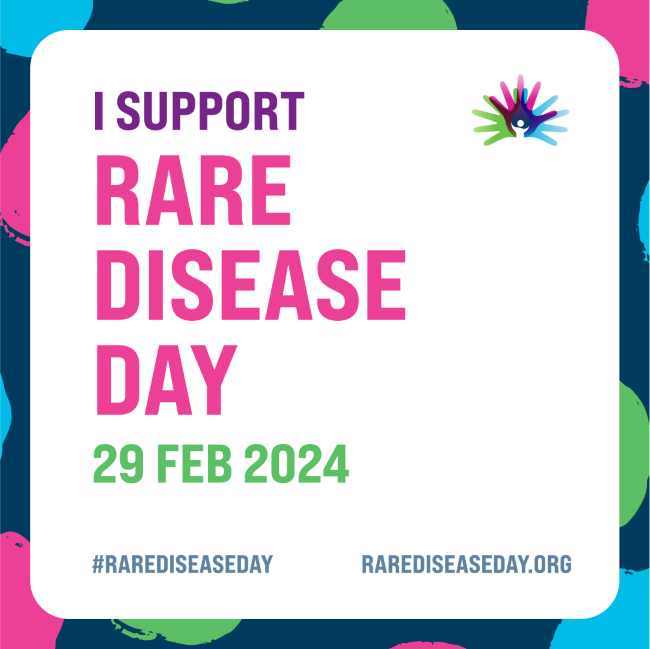
Thank you for reading this 44th edition of NA News. Here you will find news about the upcoming Rare Disease Day on 29 February, a report from one of our German partners in the Huntington disease community on her experience at the 11th International Meeting on Neuroacanthocytosis Syndromes held in Homburg in September, VPS13 forum news, a report on a recent networking effort regarding patient data, information on acanthocytes, and several photos shared by patients. Read on, learn and enjoy...
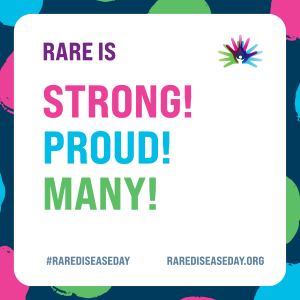 Rare Disease Day is marked in the calendar each year on the last day of February, so with 2024 being a leap year, it is on Thursday, 29 February. Rare Disease Day is marked in the calendar each year on the last day of February, so with 2024 being a leap year, it is on Thursday, 29 February.
The common theme for 2024 is that although rare conditions are individually rare, they are collectively common. Therefore, there is awareness power in sharing not only the statistics related to living with a rare condition, but it’s extremely important to tell the stories of the people behind them, to make them heard as far and wide as possible.
Where can you find us that day/week?
- On our own social media.
- On others’ social media, such as rare disease umbrella organisations:
- In person at the Rare Disease Day Westminster Reception
- Online
Join us and help spread the word! Every single share and like will support Advocacy for Neuroacanthocytosis Patients (NA Advocacy) and NA Advocacy USA!
 |
|
 |  |
Echoes from the 11th International Symposium for NA Syndromes
Michaela Winkelmann of the Association for German HD Support shares her experience of 11th Symposoium on NA Syndromes
by Despina Dinca & Michaela Winkelmann
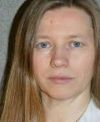 Michaela Winkelmann of the Association for German Huntington Support kindly shared her experience attending the recent 11th International Symposium on NA Syndromes and her article was published in the Huntington-Kurier, the Association’s magazine, December 2023 issue. Michaela Winkelmann of the Association for German Huntington Support kindly shared her experience attending the recent 11th International Symposium on NA Syndromes and her article was published in the Huntington-Kurier, the Association’s magazine, December 2023 issue.
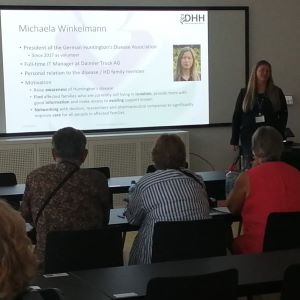 If you read our report from the most recent Symposium in September 2023 you may remember we had Michaela Winkelmann from the German Association for Huntington Support (DHH) as one of the guest speakers. She delivered an informative presentation in the patient-oriented sessions, along with an important contribution to the conversations of the panel on patient data, which was part of the scientific sessions (photo at right). If you read our report from the most recent Symposium in September 2023 you may remember we had Michaela Winkelmann from the German Association for Huntington Support (DHH) as one of the guest speakers. She delivered an informative presentation in the patient-oriented sessions, along with an important contribution to the conversations of the panel on patient data, which was part of the scientific sessions (photo at right).
Michaela kindly shared her experience attending the symposium and her article was published in the Huntington-Kurier, the Association’s magazine, December 2023 issue – see the translation below. This is distributed to the members only. Thank you once again to Michaela and DHH for being so open and accepting towards the NA community. We hope you will find her ideas useful, and we encourage you to seek your local HD centre, if one is available to you.
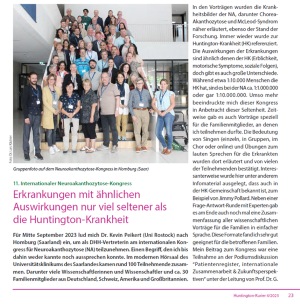 Translated article: Translated article:
11th International Congress for Neuroacanthocytosis (NA) Syndromes – similar diseases to Huntington Disease (HD), but much rarer
Dr Kevin Peikert (Rostock University) invited me as representative of the German Association for Huntington Support (DHH), to attend an international congress for the NA syndromes in Homburg, in mid-September. NA is a syndrome that I neither knew nor could pronounce until then. Around 100 participants gathered in the modern lecture hall of the Saarland University Hospital. These included many scientists and around 30 patients and family members from Germany, Switzerland, America and Great Britain.
In the lectures, the clinical views of NA syndromes (VPS13A disease – chorea-acanthocytosis and XK disease - McLeod syndrome), were explained in more detail, as was the status of research. References were made again and again to Huntington's disease (HD).
Some of the symptoms and the effects of the diseases are similar to those of HD (heredity, motor symptoms, social consequences), but there are also major differences. While around 1:10,000 people have HD, the figure for NA is around 1:1,000,000 (VPS13A disease) or even 1:10,000,000 (XK disease).
This conference impressed me even more given the rarity of the conditions. At times there were also sessions specifically for family members, which I was allowed to attend. The importance of singing (individually, in groups, in a choir or online) and speech therapy exercises (for speaking out loud) for those affected was explained there and confirmed by many of the participants. Interestingly, information material was displayed here that is also known in the HD community, for example from Jimmy Pollard. In addition to a Q&A session with experts, at the end there was also a summary of all the scientific lectures for the families in simple, lay language.
I found these formats to be very suitable for the present patients, their family members, and carers. My contribution to the scientific track of the symposium was the attendance in the panel discussion “Patient Registers, International Cooperation & Future Perspectives” led by Prof. Dr Bernhard Landwehrmeyer. Here I was able to demonstrate the importance of the EnrollHD study to the global HD community. I also participated in a session for patients and their families titled “Learning from experiences with HD” where Dr Alzbeta Mühlbäck spoke about the multidisciplinary team in Taufkirchen (Vils) and I introduced the German Association for Huntington Support (DHH).
In discussions with the families, the wish for the NA-affected families to be able to join the regional HD centres came up several times. If NA families contact the HD representatives, it would be good to give them a listening ear. In my opinion, we can learn a lot from each other and create something together that benefits everyone.
A big thank you to Dr Kevin Peikert for the invitation, to Dr Lars Kästner for organising and delivering a high-quality and informative symposium, to the NA families for the warm welcome into their community and the knowledge and information exchange, and last, but by no mean least, big thank you to Professor Dr Bernhard Landwehrmeyer for the two sessions to connect the NA and HD communities closer.
- Michaela Winkelmann
 |  |
Reports from 15th and 16th VPS13 Forums
Busy times since the previous NA News! Two VPS13 Forums were held during this time.
by Despina Dinca
 A Q&A between patients and researchers and clinicians, and a presentation on Cohen syndrome (VPS13B) were the focus of VPS13 forums 15 and 16, respectively. A Q&A between patients and researchers and clinicians, and a presentation on Cohen syndrome (VPS13B) were the focus of VPS13 forums 15 and 16, respectively.
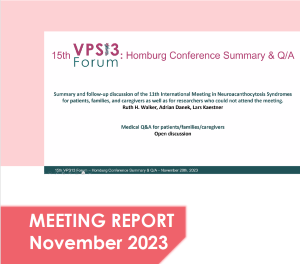 The 15th VPS13 Forum on 20 November 2023 was a special patient-oriented Q&A session. Many NA relevant topics were covered such as: dysphagia, sleep issues, weight loss, deep brain stimulation, CRISPR research, and bruxism. The Forum was well attended not only by clinicians and researchers, but also by patients or their family members or carers from around the world. we captured all of these in detail in our full report of the 15th VPS13 Forum. Please read and share it with others who may find the information useful. And if you have any questions for future Forums, email them to us! The 15th VPS13 Forum on 20 November 2023 was a special patient-oriented Q&A session. Many NA relevant topics were covered such as: dysphagia, sleep issues, weight loss, deep brain stimulation, CRISPR research, and bruxism. The Forum was well attended not only by clinicians and researchers, but also by patients or their family members or carers from around the world. we captured all of these in detail in our full report of the 15th VPS13 Forum. Please read and share it with others who may find the information useful. And if you have any questions for future Forums, email them to us!
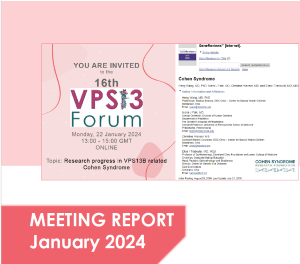 The 16th Forum on 22 January 2024 our NA syndromes community was joined by the communities of those interested and affected by the Cohen Syndrome (CS), caused by mutations in VPS13B gene. The 16th Forum on 22 January 2024 our NA syndromes community was joined by the communities of those interested and affected by the Cohen Syndrome (CS), caused by mutations in VPS13B gene.
While the clinical manifestations are rather different from VPS13A and XK diseases, there are some interesting observations in the way the research progressed throughout the past couple of decades.
Dr Muhammad Ansar (University of Lausanne, Switzerland) kindly organised the presentations and co-hosted the Forum with Dr Kevin Peikert (University of Rostock, Germany). The details can be found on our full report of the 16th VPS 13 Forum.
For those less familiar with our Forums, these are regular online meetings where clinicians, researchers and patients, their families & carers are keeping the conversations going on latest news and updates in the world of NA syndromes.
Although sometimes the scientific discussions may be a bit challenging to follow for the non-medical public, we will make these accessible in lay language as soon as possible after the meeting.
We publicise the details for joining on our social media channels, so keep an eye out nearer the time of the meeting. Alternatively, you can ask to be included on the Forum’s mailing list by emailing Dr Kevin Peikert.
Next meetings coming up in 2024: 29 April, 29 July and 28 October. Mark your calendars now!
 |  |
More Attention to the Neuropathology of Neuroacanthocytosis Project
NA-USA funded brain research garners attention in a scientific journal
by Ruth Walker
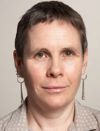 Ruth Walker recently shared the good news that a slide from the Neuropathology of Neuroacanthocytosis project at the Icahn School of Medicine at Mount Sinai (NYC) was selected for the cover of the prestigious Official Journal of the International Parkinson and Movement Disorder Society. Ruth Walker recently shared the good news that a slide from the Neuropathology of Neuroacanthocytosis project at the Icahn School of Medicine at Mount Sinai (NYC) was selected for the cover of the prestigious Official Journal of the International Parkinson and Movement Disorder Society.
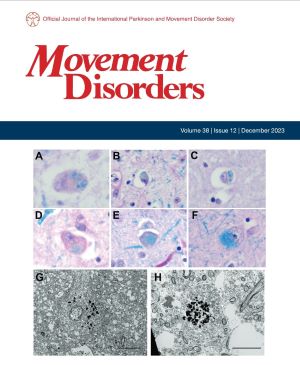 With the deepest heartfelt gratitude to those patients and families who have donated tissue to this effort. While the initial study focused on VPS13A syndrome, the next will study tissue from XK patients. With the deepest heartfelt gratitude to those patients and families who have donated tissue to this effort. While the initial study focused on VPS13A syndrome, the next will study tissue from XK patients.
This research project was funded by generous donors to Neuroacanthocytosis Advocacy USA. More information on the results of studies to date may be found in a prior NA News at: NA News 43 article.
Networking = Advocacy
The Power of Patient Data - Fringe event at the Genesis 2023 Conference
by Despina Dinca
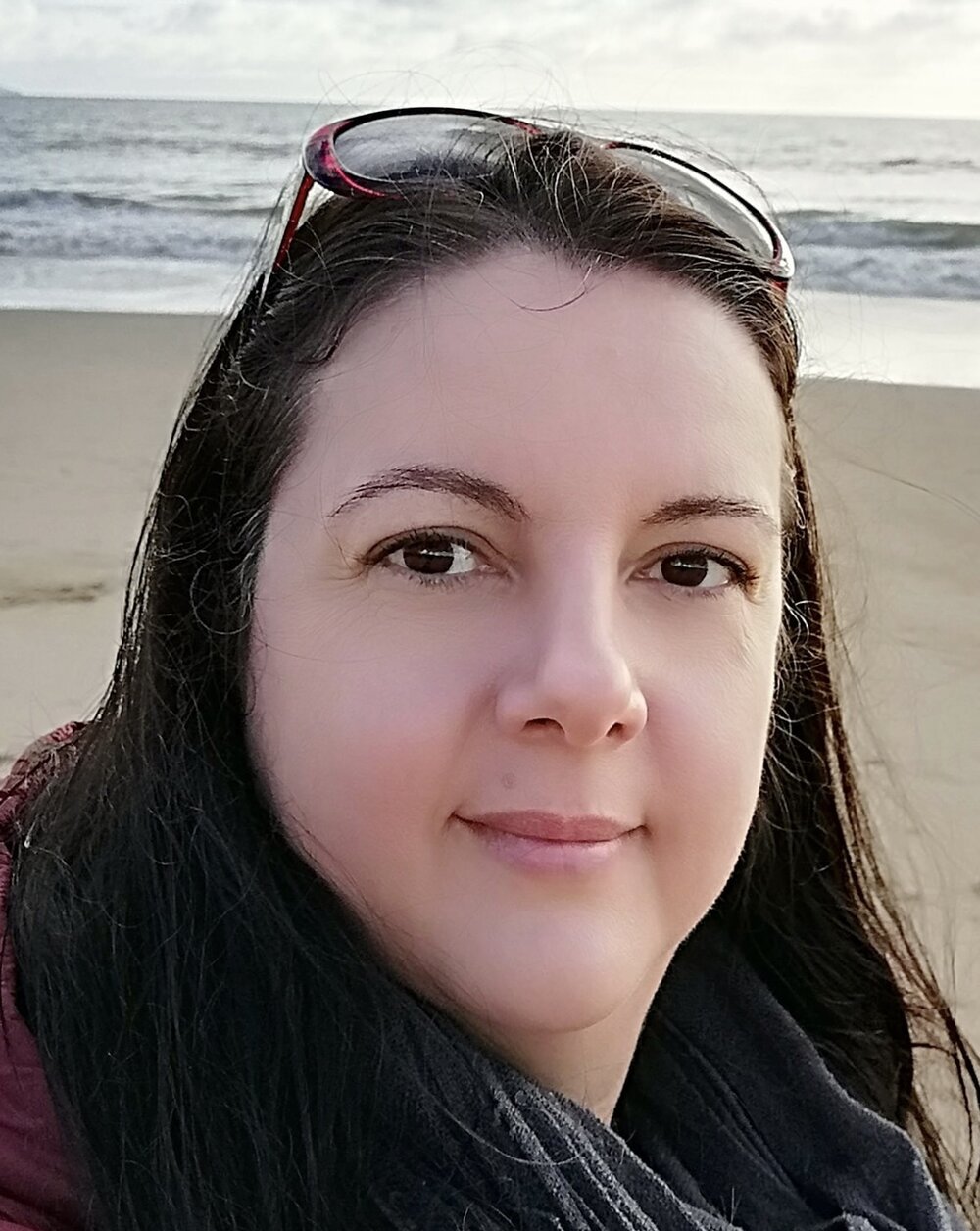 Despina Dinca, Charity Manager for The Advocacy for Neuroacanthocytosis Patients, writes of her experience networking at a Fringe event on patient data at the Genesis 2023 conference, held in London. Despina Dinca, Charity Manager for The Advocacy for Neuroacanthocytosis Patients, writes of her experience networking at a Fringe event on patient data at the Genesis 2023 conference, held in London.
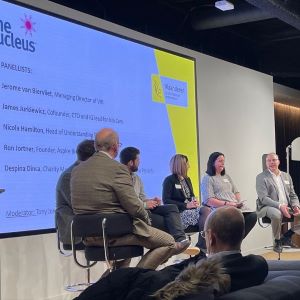 The end of 2023 saw us going to a series of networking events and it was through this that we received an invitation at one of the Fringe events of Genesis 2023 Conference. This was a panel discussion on 'Accessing Patient Data' organised by Flanders Investment & Trade - UK and One Nucleus. The end of 2023 saw us going to a series of networking events and it was through this that we received an invitation at one of the Fringe events of Genesis 2023 Conference. This was a panel discussion on 'Accessing Patient Data' organised by Flanders Investment & Trade - UK and One Nucleus.
The panel was a mix of representatives of data companies, life sciences experts and we were honoured to bring the patient view into the conversation. Despina Dinca (second from the right in the photo), our Charity Manager, was invited to be part of the discussions about patient healthcare data, the access to it and how we could unlock the power of this data to build a successful, innovative healthcare system rising up to the challenge of looking after everyone, whether rare or common conditions.
The panel along with the audience of about 60, were interested to hear about patients’ views on sharing their healthcare data for the greater good. It emerged that nowadays there is far more awareness among the patients that by sharing their data they enable science and research to progress faster. However, there is still concern about how this data is used and stored. Therefore, being sure to communicate clearly to the patients is utterly important for everyone involved. Here is where advocacy organisations like us can facilitate these communications, by deciphering the ‘small print’ of the data handling companies and making them accessible and clear to the patients. Building trust and correct understanding in the data-sharing process takes time, but it will benefit both scientific and patient communities in the long run.
The access to patient data is seen as a vital step in improving the research and development (R&D) processes. The ultimate aim is to accelerate the pathways to new drug development and making it possible to get the right drug to the patient in need of it, at the right time. Inevitably this brings to the table the commercial element of the pharmaceutical industry. Is this industry a friend or a foe in the eyes of the patient? A bit of both seemed to be the most common answer in the panel. The solution is rather somewhere in the middle, by forming an alliance between the two, where both parties can mutually support each other. The patients should remain the curators of their own shared data and should be involved in the R&D process as early as possible.
This is another place in the rare diseases environment where the patient advocacy organisations like us can help with managing a patient registry or help building one, where it doesn’t exist already. We are the existing link between patients and the R&D world, we can contribute significantly to make this work and therefore help all communities involved.
We are here to listen and understand what’s needed, what we could make possible and how we can do more! We welcome your views if you wish to share them with us.
 |  |
XK Patient with Aerial View of Life - Literally
Brad Salzmann shares his journy with McLeod syndrome
by Brad Salzmann
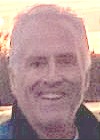 Brad Salzmann's diagnosis with XK syndrome prompted the loss of a career he dearly loved, a result common to many others with XK. Read on to see how he is using his time now, including "flying high" and giving back to his community. Brad Salzmann's diagnosis with XK syndrome prompted the loss of a career he dearly loved, a result common to many others with XK. Read on to see how he is using his time now, including "flying high" and giving back to his community.
Not exactly sure what to write, other than a brief history of my flying, my faith, and what I do with my time now. 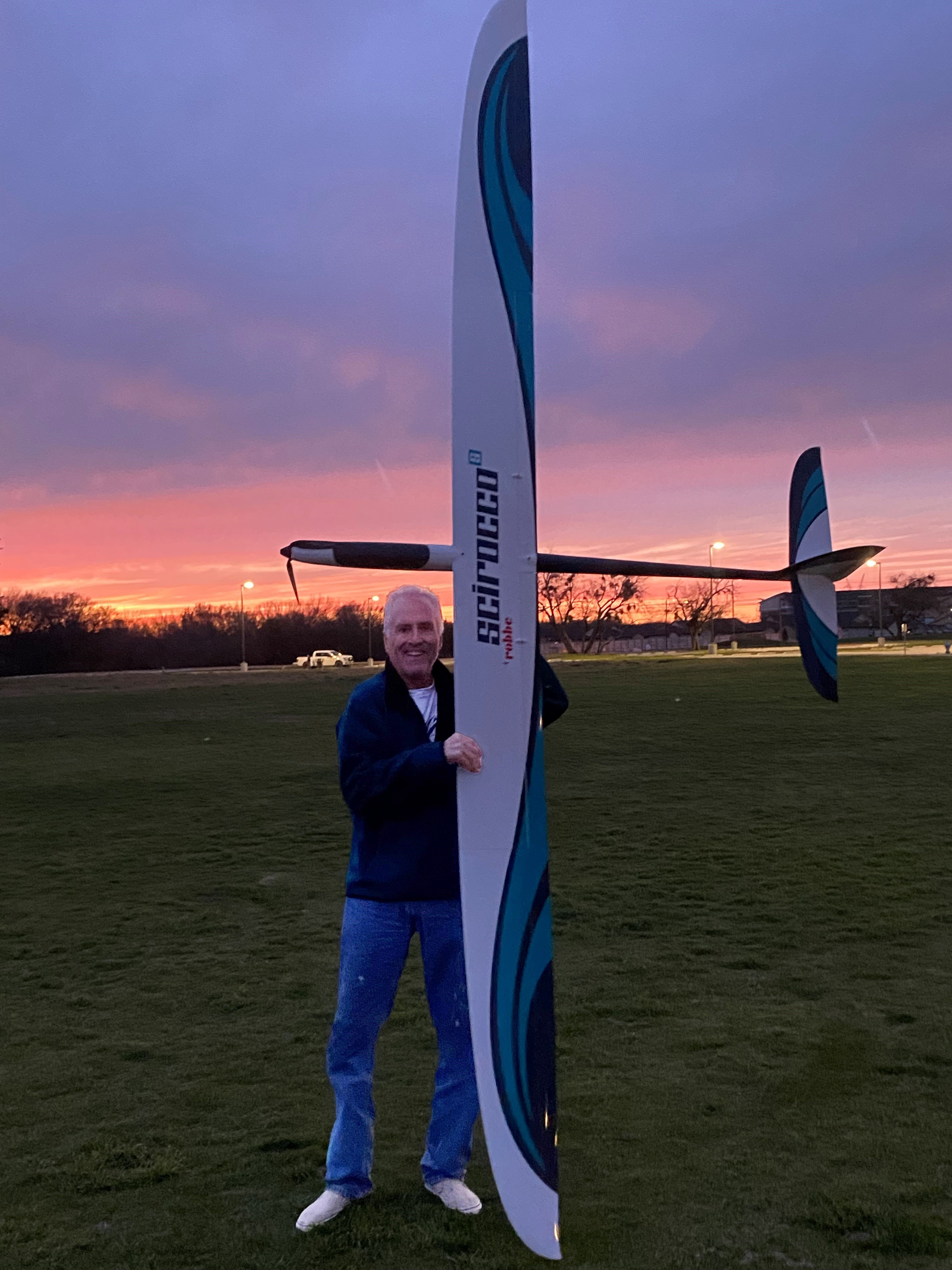
The major airlines have very good disability compensation packages if an individual pilot is grounded medically. I was at USAirways (now American) for 19 years, and Southwest for 12. I've always worked hard to save and live within my means. My wife and I do not have children and she is still a flight attendant at American Airlines. Between our savings and the disability I receive, for us the transition to me being 'unemployed' has been extremely smooth. Also, besides some minor neuropathy, I'm doing very well physically. I am not telling you all this to boast, but with the realization that many of those that suffer with this issue don't have it so good. I definitely don't want to come off sounding like I've won the lottery and now spend my days flying around, merrily hang gliding.
I am a Christian and a recovering alcoholic. As such, I felt a clear message for me was to use my time, talents, and experience in recovery to help others. I have been active the past 7 years with a local homeless shelter, in facilitating recovery meetings and mentoring. My faith has been a guiding light and this experience with McLeod. This for me is what I consider the 'next chapter'. My career has spanned everything in aviation from soloing in sailplanes at age 14, giving seaplane tours at age 18, flying fighters in the military, and spending 31 years flying for the airlines. My father is retired Delta Airlines and was a great guide and inspiration for through the years. I totaled around 25,000 hours of flying when I was diagnosed and grounded for flying fixed winged aircraft. Hang gliding and Ultralight aircraft do not require a medical certificate.
It's been a great run. Certain things I miss, but running off a cliff hanging by a couple of straps, under a large kite with a steering bar, has been a LOT of fun. Also, much can be aid of serving Him and serving others. He has me right where he wants me, and I am extremely grateful to be here.
Sincerely,
Brad Salzmann
[Check out more photos of Brad's activities in the image gallery below.]
 |  |
Patient News Corner
Photo-share from NA patients
by Joy Willard-Williford
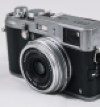 Several patients recently gave permission to share some happy moments. Several patients recently gave permission to share some happy moments.
January marked a special birthday for Canadian Mike Koutis, who has VPS13A (ChAc) - the big 5-0! Check out that blanket, and enjoy pics of several other patients and their families.
We love to see and share your photos, so please email photos for inclusion in the next NA News to joy@naadvocacyusa.org
Susan Wagner Shares Article on Acanthocytes
July 2023 article in National Library of Medicine: National Center for Biotechnical Information
by Susan Wagner
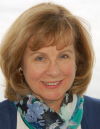 Susan Wagner, president of Neuroacanthocytosis Advocacy USA (NA-USA) recently stumbled upon a descriptive article on acanthocytes. Susan Wagner, president of Neuroacanthocytosis Advocacy USA (NA-USA) recently stumbled upon a descriptive article on acanthocytes.
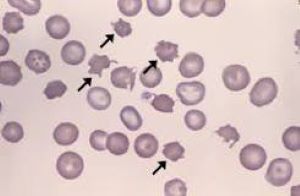 Please find below a link to a July 24 2023 update of a publication on acanthocytes. It includes another good reminder on the importance of autologous blood transfusion for XK patients: Please find below a link to a July 24 2023 update of a publication on acanthocytes. It includes another good reminder on the importance of autologous blood transfusion for XK patients:
https://www.ncbi.nlm.nih.gov/books/NBK549788/#article-17052.s1
|
|
|